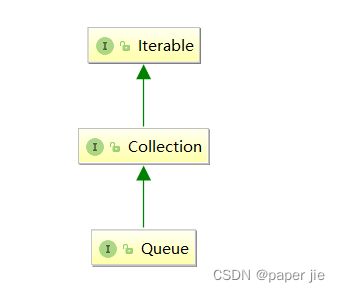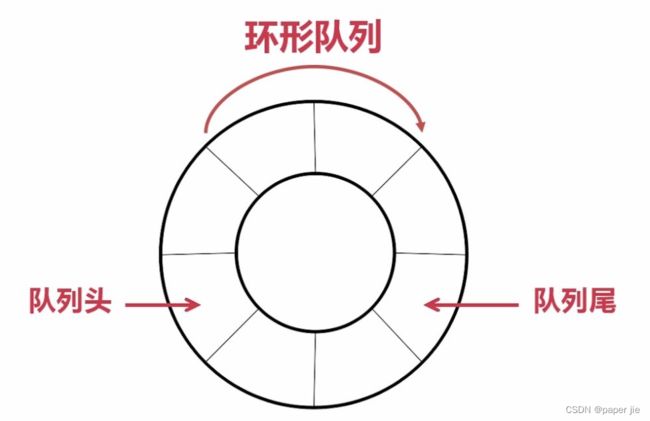【数据结构】栈与队列
作者主页:paper jie 的博客
本文作者:大家好,我是paper jie,感谢你阅读本文,欢迎一建三连哦。
本文录入于《JAVA数据结构》专栏,本专栏是针对于大学生,编程小白精心打造的。笔者用重金(时间和精力)打造,将javaSE基础知识一网打尽,希望可以帮到读者们哦。
其他专栏:《算法详解》《C语言》《javaSE》等
内容分享:本期将会分享数据结构中的栈与队列
目录
栈
栈的概念
栈的使用
栈的模拟实现
栈的应用
栈,虚拟机栈,栈帧的区分
队列(Queue)
队列的概念
队列的使用
队列模拟实现
循环队列
双端队列
栈
栈的概念
栈它是一种特殊的线性表,只允许在固定的一端进行插入和删除元素操作。进行数据插入和删除操作的一端称为栈顶,另一端称为栈底。栈中的数据元素遵守着先进后出的规则。
压栈:栈的插入操作叫做进栈,压栈,入栈,入数据在栈顶。
出栈:栈的删除操作叫做出栈。出数据在栈顶。
栈的使用
代码示范:
public class Test {
public static void main(String[] args) {
Stack stack = new Stack<>();
stack.push(1);
stack.push(2);
stack.push(3);
stack.push(4);
stack.push(5);
System.out.println(stack.peek());
System.out.println(stack.pop());
System.out.println(stack.empty());
System.out.println(stack.size());
}
} 栈的模拟实现
Stack继承了Vector,Vector和ArrayList类似,都是动态的顺序表,但不同的是Vector是线性安全的。
代码模拟实现:
public class MyStack implements Istack{
private int[] elem;
private int usedsize;
private static final int DEFAULT_CAPACITY = 10;
public MyStack() {
this.elem = new int[DEFAULT_CAPACITY];
}
@Override
public void push(int x) {
if(full()) {
elem = Arrays.copyOf(elem, 2*elem.length);
}
elem[usedsize] = x;
usedsize++;
}
@Override
public boolean full() {
if(usedsize == elem.length) {
return true;
}
return false;
}
@Override
public int pop() {
if(Empty()) {
throw new Emptyexception("数组为空");
}
int ret = elem[usedsize-1];
usedsize--;
return ret;
}
@Override
public int peek() {
if(Empty()) {
throw new Emptyexception("数组为空");
}
return elem[usedsize - 1];
}
@Override
public int size() {
return usedsize;
}
@Override
public boolean Empty() {
if(usedsize == 0) {
return true;
}
return false;
}
}栈的应用
将递归转化为循环
// 递归方式
void printList(Node head){
if(null != head){
printList(head.next);
System.out.print(head.val + " ");
}
}
// 循环方式
void printList(Node head){
if(null == head){
return;
}
Stack s = new Stack<>();
// 将链表中的结点保存在栈中
Node cur = head;
while(null != cur){
s.push(cur);
cur = cur.next;
}
// 将栈中的元素出栈
while(!s.empty()){
System.out.print(s.pop().val + " ");
}
} 栈,虚拟机栈,栈帧的区分
栈:是一种数据结构
虚拟机栈:是java虚拟机JVM中分配的一块内存
栈帧:是在调用方法的时候,会在虚拟机中为这个方法分配一块内存
队列(Queue)
队列的概念
队列:只允许在一端进行插入数据操作,在另一端进行删除数据操作的特殊线性表,队列具有先进先出FIFO(FirstIn First Out)
入队列:进行插入操作的一端称为队尾(Tail/Rear)
出队列:进行删除操作的一端称为队头
队列的使用
在java中,Queue是一个接口,底层是通过链表来实现的
这里要注意一个点:Queue是一个接口,在实例化时必须实例化LinkedList的对象,因为LinkedList实现了Queue接口
public static void main(String[] args) {
Queue q = new LinkedList<>();
q.offer(1);
q.offer(2);
q.offer(3);
q.offer(4);
q.offer(5); // 从队尾入队列
System.out.println(q.size());
System.out.println(q.peek()); // 获取队头元素
q.poll();
System.out.println(q.poll()); // 从队头出队列,并将删除的元素返回
if(q.isEmpty()){
System.out.println("队列空");
}else{
System.out.println(q.size());
}
} 队列模拟实现
链式结构对列:
public class MyLinkqueue {
static class ListNode {
int val;
ListNode prev;
ListNode next;
public ListNode(int val) {
this.val = val;
}
}
ListNode head;
ListNode last;
int usedsize;
public void offer(int val) {
ListNode node = new ListNode(val);
if(head == null) {
head = node;
last = node;
usedsize++;
return;
}
last.next = node;
node.prev = last;
last = node;
usedsize++;
}
public int poll() {
if(head == null) {
return -1;
}
int ret = head.val;
if(head.next == null) {
head = null;
last = null;
} else {
head.next.prev = null;
head = head.next;
}
usedsize--;
return ret;
}
public int peek() {
if(head == null) {
return -1;
}
return head.val;
}
public boolean Empty(){
return head == null;
}
public int size() {
return usedsize;
}
}循环队列
实际中我们有时还会使用一种队列叫循环队列,操作系统课程讲解生产者消费者模型时可以就会使用循环队列,环形队列通常使用数组实现
代码:
class MyCircularQueue {
int[] elem;
int front;
int rear;
public MyCircularQueue(int k) {
elem = new int[k+1];
}
public boolean enQueue(int value) {
if(isFull()) {
return false;
}
elem[rear] = value;
rear = (rear+1) % elem.length;
return true;
}
public boolean deQueue() {
if(isEmpty()) {
return false;
}
front = (front+1)% elem.length;
return true;
}
public int Front() {
if(isEmpty()) {
return -1;
}
return elem[front];
}
public int Rear() {
if(isEmpty()) {
return -1;
}
int ret = (rear == 0) ? elem.length-1 : rear-1;
return elem[ret];
}
public boolean isEmpty() {
return front == rear;
}
public boolean isFull() {
return (rear+1) % elem.length == front;
}
}双端队列
双端队列是指允许两端都可以进行入队和出队操作的队列,deque 是 “double ended queue” 的简称,那就说明元素可以从队头出队和入队,也可以从队尾出队和入队,Deque是一个接口,使用时必须创建LinkedList的对象








